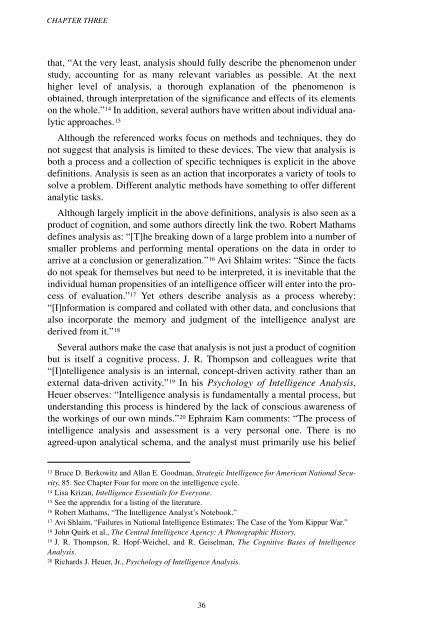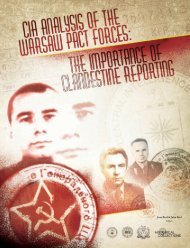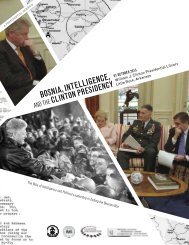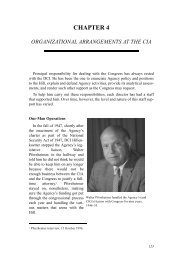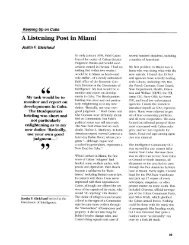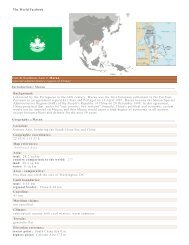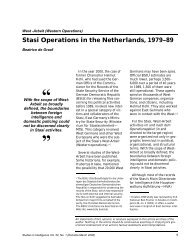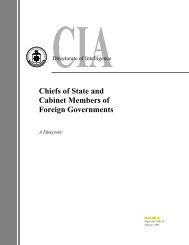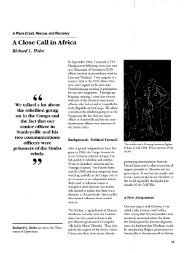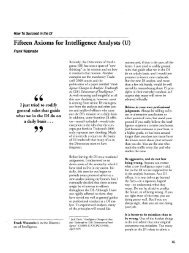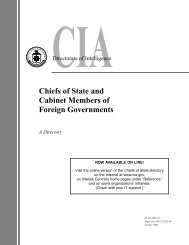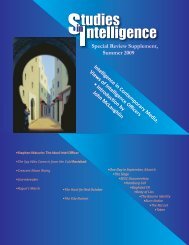Analytic Culture in the U.S. Intelligence Community (PDF) - CIA
Analytic Culture in the U.S. Intelligence Community (PDF) - CIA
Analytic Culture in the U.S. Intelligence Community (PDF) - CIA
You also want an ePaper? Increase the reach of your titles
YUMPU automatically turns print PDFs into web optimized ePapers that Google loves.
CHAPTER THREE<br />
that, “At <strong>the</strong> very least, analysis should fully describe <strong>the</strong> phenomenon under<br />
study, account<strong>in</strong>g for as many relevant variables as possible. At <strong>the</strong> next<br />
higher level of analysis, a thorough explanation of <strong>the</strong> phenomenon is<br />
obta<strong>in</strong>ed, through <strong>in</strong>terpretation of <strong>the</strong> significance and effects of its elements<br />
on <strong>the</strong> whole.” 14 In addition, several authors have written about <strong>in</strong>dividual analytic<br />
approaches. 15<br />
Although <strong>the</strong> referenced works focus on methods and techniques, <strong>the</strong>y do<br />
not suggest that analysis is limited to <strong>the</strong>se devices. The view that analysis is<br />
both a process and a collection of specific techniques is explicit <strong>in</strong> <strong>the</strong> above<br />
def<strong>in</strong>itions. Analysis is seen as an action that <strong>in</strong>corporates a variety of tools to<br />
solve a problem. Different analytic methods have someth<strong>in</strong>g to offer different<br />
analytic tasks.<br />
Although largely implicit <strong>in</strong> <strong>the</strong> above def<strong>in</strong>itions, analysis is also seen as a<br />
product of cognition, and some authors directly l<strong>in</strong>k <strong>the</strong> two. Robert Mathams<br />
def<strong>in</strong>es analysis as: “[T]he break<strong>in</strong>g down of a large problem <strong>in</strong>to a number of<br />
smaller problems and perform<strong>in</strong>g mental operations on <strong>the</strong> data <strong>in</strong> order to<br />
arrive at a conclusion or generalization.” 16 Avi Shlaim writes: “S<strong>in</strong>ce <strong>the</strong> facts<br />
do not speak for <strong>the</strong>mselves but need to be <strong>in</strong>terpreted, it is <strong>in</strong>evitable that <strong>the</strong><br />
<strong>in</strong>dividual human propensities of an <strong>in</strong>telligence officer will enter <strong>in</strong>to <strong>the</strong> process<br />
of evaluation.” 17 Yet o<strong>the</strong>rs describe analysis as a process whereby:<br />
“[I]nformation is compared and collated with o<strong>the</strong>r data, and conclusions that<br />
also <strong>in</strong>corporate <strong>the</strong> memory and judgment of <strong>the</strong> <strong>in</strong>telligence analyst are<br />
derived from it.” 18<br />
Several authors make <strong>the</strong> case that analysis is not just a product of cognition<br />
but is itself a cognitive process. J. R. Thompson and colleagues write that<br />
“[I]ntelligence analysis is an <strong>in</strong>ternal, concept-driven activity ra<strong>the</strong>r than an<br />
external data-driven activity.” 19 In his Psychology of <strong>Intelligence</strong> Analysis,<br />
Heuer observes: “<strong>Intelligence</strong> analysis is fundamentally a mental process, but<br />
understand<strong>in</strong>g this process is h<strong>in</strong>dered by <strong>the</strong> lack of conscious awareness of<br />
<strong>the</strong> work<strong>in</strong>gs of our own m<strong>in</strong>ds.” 20 Ephraim Kam comments: “The process of<br />
<strong>in</strong>telligence analysis and assessment is a very personal one. There is no<br />
agreed-upon analytical schema, and <strong>the</strong> analyst must primarily use his belief<br />
13<br />
Bruce D. Berkowitz and Allan E. Goodman, Strategic <strong>Intelligence</strong> for American National Security,<br />
85. See Chapter Four for more on <strong>the</strong> <strong>in</strong>telligence cycle.<br />
14<br />
Lisa Krizan, <strong>Intelligence</strong> Essentials for Everyone.<br />
15<br />
See <strong>the</strong> apprendix for a list<strong>in</strong>g of <strong>the</strong> literature.<br />
16<br />
Robert Mathams, “The <strong>Intelligence</strong> Analyst’s Notebook.”<br />
17<br />
Avi Shlaim, “Failures <strong>in</strong> National <strong>Intelligence</strong> Estimates: The Case of <strong>the</strong> Yom Kippur War.”<br />
18<br />
John Quirk et al., The Central <strong>Intelligence</strong> Agency: A Photographic History.<br />
19<br />
J. R. Thompson, R. Hopf-Weichel, and R. Geiselman, The Cognitive Bases of <strong>Intelligence</strong><br />
Analysis.<br />
20<br />
Richards J. Heuer, Jr., Psychology of <strong>Intelligence</strong> Analysis.<br />
36


